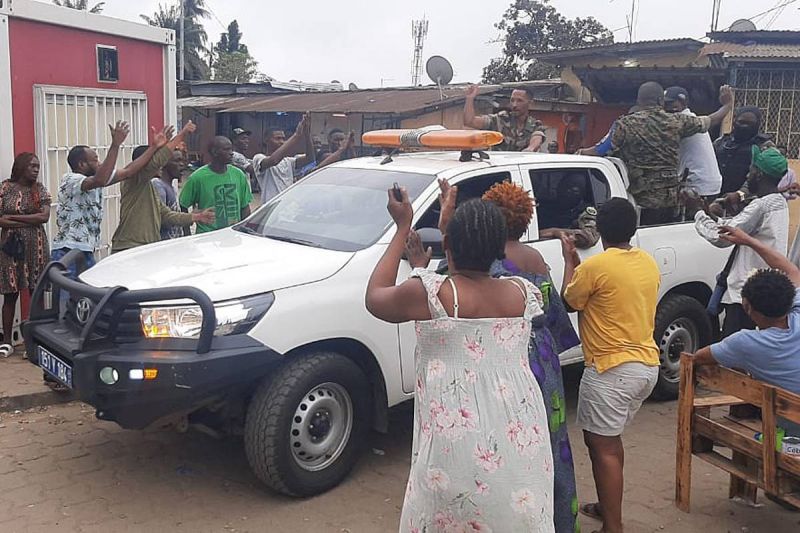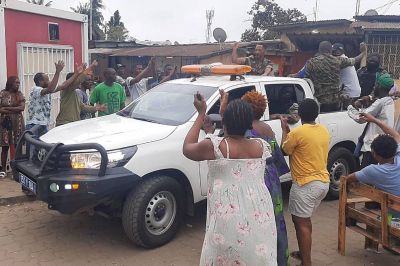
Residents in Gabon applaud members of the security forces in the Plein Ciel neighborhood of Libreville on August 30, 2023, after a group of Gabonese military officers announced the "end of the current regime." (Credit: AFP)
BEIRUT — Lebanese residents in Gabon, where a military coup against President Ali Bongo was staged Tuesday night, are safe for the moment, Ali Katour, editor-in-chief of the news website Al-Jalia Online [The Online Diaspora], told L'Orient-Le Jour.
"The situation in Gabon remains stable for now, and Lebanese nationals on-site are not in danger," said Katour, who is based in Gabon, over the phone.
Rebel military personnel announced Wednesday that they were "ending the current regime" in Gabon and had placed the outgoing president, Ali Bongo Ondimba, who had just been declared re-elected after 14 years in power, under house arrest, reported AFP.
Katour said he was "in close communication with the Lebanese government" to anticipate any potential deterioration in the situation and take necessary measures to secure the Lebanese diaspora.
Until this coup, condemned by France, this oil-rich central African country had been ruled by the Bongo family for over 55 years.
On Wednesday afternoon, the Lebanese Ministry of Foreign Affairs said it was monitoring the situation in Gabon "with concern."
In a statement published on X, the ministry "called on Lebanese residents in Gabon to be extremely cautious and to stay at home until the situation calms down."
The Ministry also provided an emergency number linked to the Lebanese Embassy in Gabon's capital, Libreville: +241 66 40 13 52.
The Lebanese Embassy in Gabon was not immediately available for comment.
Safe 'so far'
"All Lebanese are located in regions that, for the moment, remain stable," he added. "The Gabonese army is maintaining security and stability up to this point," Katour stated. "However, there is a risk of tensions that could arise at any moment and in any place."
Repatriation of Lebanese nationals
When asked about a potential decision by the Lebanese government to repatriate its citizens, the journalist stated that "at this stage, there is no war or acts of vandalism that would compel the Lebanese authorities to order a repatriation ... If that were the case, an emergency plan would certainly be put in place."
"We are in close communication with the Lebanese authorities, especially with the secretary-general of the Higher Relief Committee, Mohammad Kheir, in case the situation further deteriorates," Katour added.
He said he was not sure of the exact number of Lebanese nationals living in Gabon, but estimated it could be "1,000 to 1,500 people."
Many Lebanese nationals work on the African continent, where some have been established for several generations.
Gabon's coup occurred during a curfew and while the internet was cut off nationwide— two measures imposed by the Gabonese government on Saturday before polling stations closed to prevent potential "violence." The internet was later restored.
The Gabonese military claimed the elections had "not met the conditions for a transparent vote" and denounced "irresponsible, unpredictable governance, which results in the continuous deterioration of social cohesion, risking pushing the country into chaos."
They announced the dissolution of all institutions in the country and the closure of Gabon's borders "until further notice."

